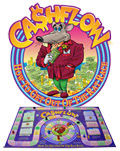What now?
There are three master asset classes: business, property and paper. Business takes time but can bring you passive income once it is setup and managed properly. It has inherent issues like labour relations, theft, failure rates of 90% within the first 5 years and only 1 in 10 of the remaining 10% survive the next 5 years. Plus you work harder as a small business owner than you would as an employee. Suffice to say it does give one more freedom and managed properly can become a viable passive earner for you. The ideal is to build a business that will list on the stock market.
Property is an excellent long term asset base to build. It too has inherent challenges like rising interest rates and problem tenants. House prices have increased by only 9% on average according to ABSA in 2006. ABSA's home loan book is the largest of all the banks in SA and they reported only a 9% increase over 2005 prices. Then unless one was holding property 5 years ago, there is inevitably a shortfall to cover out of your pocket. This results in a negative cash flow. It's a tough way to build wealth. Once the property is in the positive it's all good! The trouble is that it could take 3-6 months for you to access your money as property takes time to sell. It's not liquid with easy cash access. The ideal is to use profits from shares and business to invest in your property portfolio over the long term.
Paper assets like shares have the superb track record of achieving 27% average return year-on-year for the last 20 years looking at the JSE Overall index. Some companies get suspended and some delisted. The percentage is negligible as the JSE is stringent on criteria for companies to get listed in the first place. The AltX, or Alternative Exchange, is somewhat less strict on their criteria but it is the training ground for companies that want to make it to the JSE. Shares and investing in companies you don't need to run offer a passive growth that beats inflation and requires little time - when you have the knowledge - to invest wisely in the market. Shares offer great returns with little starting capital and pays dividends. The major pulling card with investing in shares is that your money is available within 7 days. It is highly liquid and easy access to cash.
Paper assets and investing in shares is risky, isn't it? Only because the person who told you that they lost money didn't have eductaion in how to buy and sell shares. If you had a code 8 driver's licence does that mean you know how to drive a 18 wheeler truck? I don't think so. So why not get the learner's licence first and pay for your Investor's Financial Driver's Ed lessons before you enter the market? So many people contact us after they go straight into trading Forex or Warrants without any more experience than what they read in a book. They have no share or equity trading experience whatsoever and when asked, have no clue what a Candlestick, MACD or RSI indicator even is. How can one expect to beat the market when you enter it blindfolded?
So, JOIN a CASHFLOW CLUB, Get to know How To Trade Stocks & Learn to Build Businesses right here.



